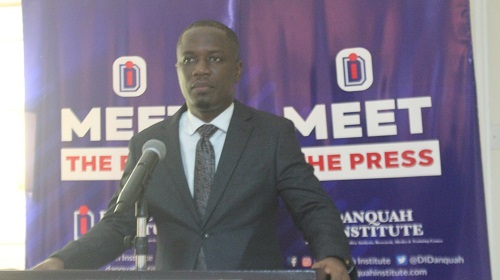
Danquah Institute advocates fiscal consolidation strategy
Policy think tank, Danquah Institute (DI) has underscored the importance of a robust fiscal consolidation strategy based on prudent expenditure realignment and realistic revenue projection to address Ghana's economic challenges.
Advertisement
In a maiden edition of the Institute’s planned monthly media encounter held on Tuesday, February 13, 2024, dubbed: “Analysis of the Ghanaian economy”, DI Head of Research, Dr. Frank Bannor, said Ghana's public debt growth rate had outpaced domestic revenue growth since the country ended its participation in the Highly Indebted Poor Countries (HIPC) initiative in 2006.
This trend, he noted, highlights the need for a paradigm shift in fiscal management.
Enough is enough
In line with recent remarks by Vice President Dr. Bawumia, the DI also reiterated the urgency for change, stating that "enough is enough" regarding unsustainable fiscal practices.
The DI Head of Research stressed the necessity of domestic resource mobilization as the primary means of financing developmental projects, emphasising the limitations and risks associated with excessive borrowing.
To achieve sustainable revenue generation, he advocated for a focus on tax revenue, citing its predictability and stability compared to non-tax revenue sources.
He further highlighted the historical tax elasticity of Ghana's GDP, indicating the potential for significant revenue growth through targeted tax reforms.
To raise the tax-to-GDP ratio to 20% by 2028, the DI proposed measures outlined by Dr. Bawumia to achieve sustained tax revenue growth, including simplifying the tax regime, enhancing compliance, and leveraging digital platforms for tax collection.
Welcoming Bawumia's vision
The Danquah Institute welcomed initiatives such as the flat rate tax, online tax filing, and widening the tax net to ensure broader participation in revenue generation.
The Institute also emphasised the broad support for these measures among various stakeholders, including business associations, academia, and industry players.
In addition to tax reforms, the DI head of Research underscored the importance of linking the Ghana Card and Tax Identification Number (TIN) to streamline transactions, reduce corruption, and safeguard the fiscal framework.
The institute believes that such measures will contribute to improving Ghana's creditworthiness and fiscal stability.




